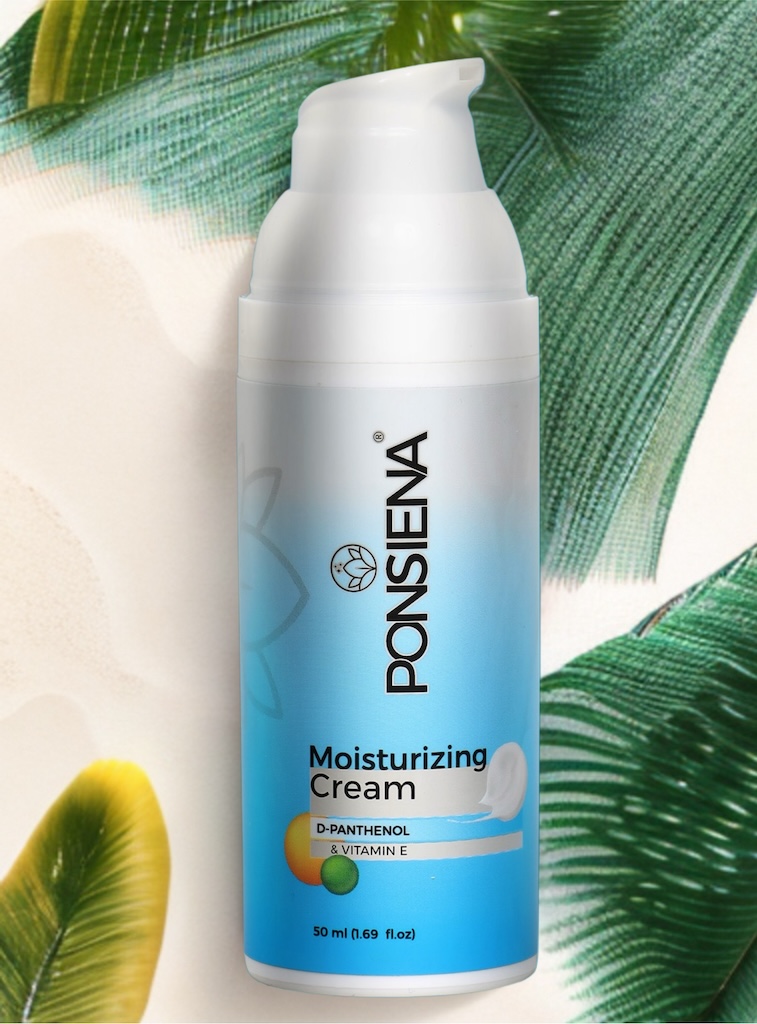Ponsiena Moisturizing Cream

Our moisturizing cream contains almond oil and lanolin which together with Vitamin E and D-Panthenol create a barrier between your skin and the outside world, so that your skin ratain its water and stay hydrated.
D-Panthenol
Pantothenic acid is essential to normal epithelial function. It is a component of coenzyme A, which serves as a cofactor for a variety of enzyme-catalyzed reactions that are important in the metabolism of carbohydrates, fatty acids, proteins, gluconeogenesis, sterols, steroid hormones, and porphyrins. The topical use of dexpanthenol, the stable alcoholic analog of pantothenic acid, is based on good skin penetration . Topical dexpanthenol acts like a moisturizer, improving stratum corneum hydration, reducing transepidermal water loss and maintaining skin softness and elasticity. Activation of fibroblast proliferation, which is of relevance in wound healing . Accelerated re- epithelization in wound healing, monitored by means of the transepidermal water loss as an indicator of the intact epidermal barrier function, has also been seen. Dexpanthenol has been shown to have an anti-inflammatory effect on experimental ultraviolet-induced erythema. Beneficial effects of dexpanthenol have been observed in patients who have undergone skin transplantation or scar treatment, or therapy for burn injuries and different dermatoses. The stimulation of epithelization, granulation and mitigation of itching were the most prominent effects of formulations containing dexpanthenol. In double-blind placebo-controlled clinical trials, dexpanthenol was evaluated for its efficacy in improving wound healing. Epidermal wounds treated with dexpanthenol emulsion showed a reduction in erythema, and more elastic and solid tissue regeneration. Monitoring of transepidermal water loss showed a significant acceleration of epidermal regeneration as a result of dexpanthenol therapy, as compared with the vehicle. In an irritation model, pretreatment with dexpanthenol cream resulted in significantly less damage to the stratum corneum barrier, compared with no pretreatment. Adjuvant skin care with dexpanthenol considerably improved the symptoms of skin irritation, such as dryness of the skin, roughness, scaling, pruritus, erythema, erosion/fissures, over 3 to 4 weeks. Usually, the topical administration of dexpanthenol preparations is well tolerated, with minimal risk of skin irritancy or sensitization.
Sweet almond oil
Reduces the appearance of stretch marks. According to a 2016 study, sweet almond oil may be an effective treatment for preventing and reducing stretch marks. Almond oil had been used in Ancient Chinese, Ayurvedic and Greco-Persian schools of Medicine to treat dry skin conditions such as psoriasis and eczema. Almond oil to the skin may have the following benefits: Reduces puffiness and under-eye circles. Because almond oil is an antiinflammatory, it may help ease swelling of the skin. Improves complexion and skin tone. Due to its emollient properties, almond oil has the potential to improve both complexion and skin tone. Treats dry skin. Almond oil has been used for centuries to treat dry skin conditions, including eczema and psoriasis.
Vitamin E
Vitamin E is an important fat-soluble antioxidant and has been in use for more than 50 years in dermatology. It is an important ingredient in many cosmetic products. It protects the skin from various deleterious effects due to solar radiation by acting as a free-radical scavenger. UV light and sun exposure reduce vitamin E levels in skin. Vitamin E levels also decrease with age.
Lanolin
Lanolin is a yellow fat obtained from sheep's wool. It has traditionally been used topically to treat sore, cracked nipples during breastfeeding.